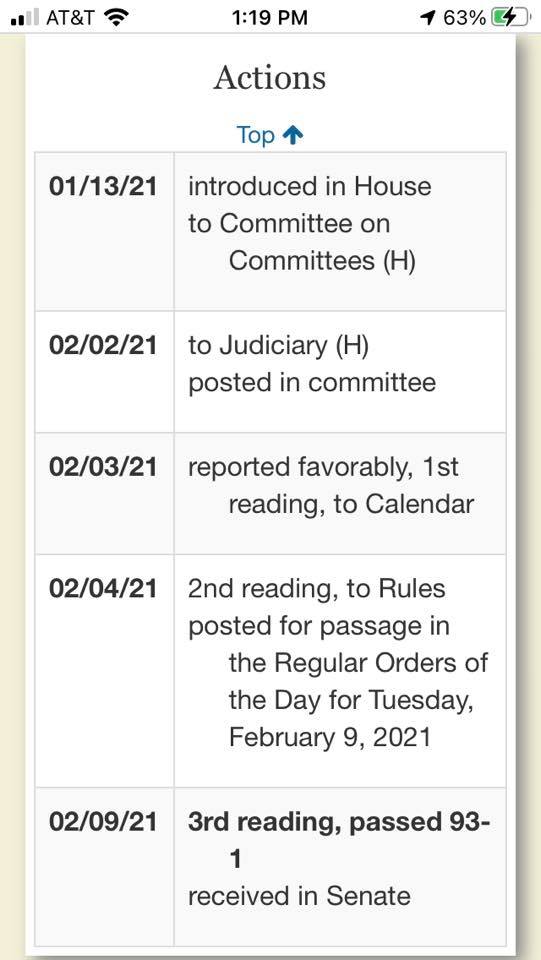
This is a final plea to Kentucky lawmakers to put the slow wheels on a new open records exception that is being fast tracked.
HB 273 would create an exception to the open records law for "photographs or videos that depict the death, killing, rape, or sexual assault of a person." It contains an emergency clause and would take effect upon passage rather than the normal effective date of legislation.
https://apps.legislature.ky.gov/record/21rs/hb273.html
It passed the House by a vote of 93-1 on February 9. A companion bill awaits it in the Senate.
https://apps.legislature.ky.gov/record/21rs/SB130.html
Although HB 273 makes no reference to the courts whatsoever, the bill's sponsor, Rep. Chris Freeland, claims it only applies to photos and videos in the possession of the courts.
At long last, will someone please tell Rep. Freeland that the open records law does not apply to records of the courts. The Kentucky Supreme Court made this abundantly clear in 1978 — two years after the 45 year old open records law was enacted.
https://law.justia.com/cases/kentucky/supreme-court/1978/570-s-w-2d-617…
Let's be clear: HB 273 will expressly apply to all public agencies if enacted.
HB 273 excludes body cam video that is separately addressed in KRS 61.168 — a statute that was enacted in 2018 after years of careful vetting to ensure both public and private interests were protected.
https://apps.legislature.ky.gov/law/statutes/statute.aspx?id=47987
No consideration has been given in HB 273 to the public's interest in surveillance and bystander photos and videos of deaths, killings, rapes, or sexual assaults that have a direct or indirect bearing on how public agencies and employees performed their public duties. The clearest and most obvious example: the bystander video that revealed egregious police misconduct in the murder of George Floyd.
HB 273 erects an impenetrable barrier to public access on the pretext of "protecting families' privacy."
No doubt it would, in some instances, protect families' privacy. But in others, it will be used to "protect" — more accurately "hide" — gross public agency misconduct.
The existing privacy exception in the open records law already protects private interests, including those HB 273 targets, in the absence of a competing public interest in disclosure — i.e., where the photo or video reveals nothing about how public agencies or employees discharges their duties or the private interest are so substantial that they outweigh a lesser public interest.
https://apps.legislature.ky.gov/law/statutes/statute.aspx?id=49156 (See Section (1)(a))
However, where the photo or video reveals that the public agencies or employees failed to perform their duties — or worse, abused their authority — private rights may sometimes yield to the public interest in disclosure.
Not if HB 273 is enacted.
Some take comfort in the fact that HB 273 provides that "such photographs or videos shall be made available at the request of any party who was involved in the underlying incident, including the party, his or her immediate family, legal representative, or any involved insurance company or their representative."
They argue that "any party involved in the underlying incident" can agree to public agency release of the protected photos and videos to the public.
But the loose language of HB 273 leaves considerable room for doubt about this interpretation.
Compare the HB 273 language to language in a statute restricting disclosure of autopsy photographs.
https://apps.legislature.ky.gov/law/statutes/statute.aspx?id=46287
Enacted in 2017 — when lawmakers valued precision and clarity — KRS 72.031 is not embedded in the open records law as an exception but is incorporated into the open records law by KRS 61.878(1)(l). The latter exception authorizes public agencies to withhold records made confidential by the General Assembly.
KRS 72.031 provides:
"No autopsy photograph, other visual image in whatever form, video recording, or audio recording shall be open to the public •unless the spouse or personal representative of the decedent provides an express waiver to the state medical examiner, coroner, or other public official in lawful possession of those materials to make those materials public.•"
Stated simply, under KRS 72.031 an autopsy photo will be disclosed to the public •if the deceased person's spouse or personal representative "provides an express waiver" to the public agency that possesses the photo.•
KRS 72.031 goes on to mandate disclosure of the autopsy photo to ten narrowly tailored categories of persons or entities with a legal entitlement or interest — spouses, children, surviving parents, personal representatives, law enforcement agencies with a bona fide interest, beneficiaries under an insurance policy, insurance companies with the written permission of the decedent's spouse or personal representative, attorneys in a matter arising out of the decedent's death, pro se defendants in any criminal case arising out of the decedent's death, and more — all specifically described.
An extensive legal mechanism is established in Section 8 of KRS 72.031 for Circuit Court review and grant of a petition to view or copy the autopsy photo "upon a showing of good cause," under "restrictions or stipulations that the court deems appropriate."
A quick review of KRS 61.168 confirms that the same clearly stated "checks and balances" were written into the body cam video laws.
Every "i" dotted; every "t" crossed.
Not so with HB 273.
Do not delude yourself or allow others to delude you. HB 273 will enable public agencies to hide a multitude of sins.
HB 273 is a model of poor draftsmanship and ambiguity. It will inevitably lead to misuse, abuse, and confusion. It is the proverbial green light to public agency secrecy under the most damning circumstances.
HB 273 disserves the public — including families.



